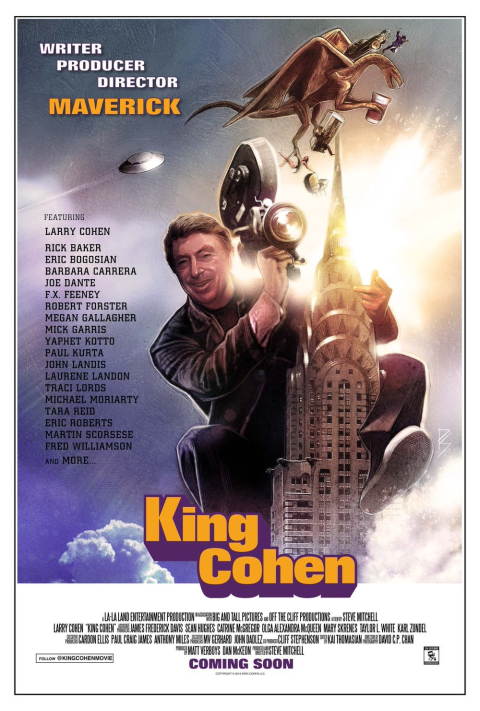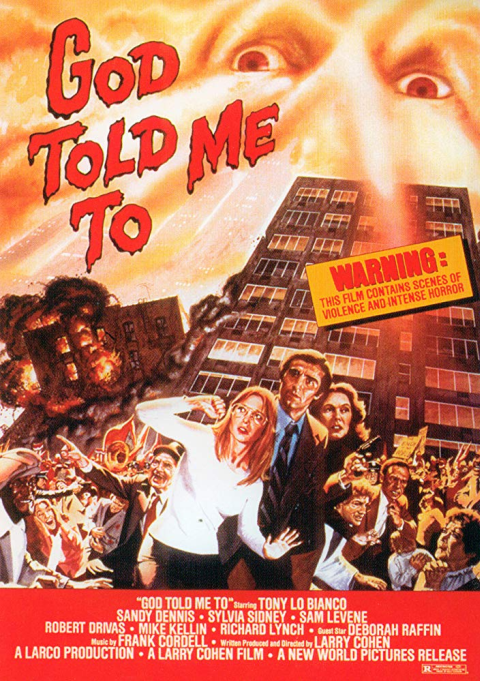King Cohen: The Wild World of Filmmaker Larry Cohen
Written and Directed by Steve Mitchell
Interviewees: J.J. Abrams, Rick Baker, Eric Bogosian, Barbara Carrera, Larry Cohen, Joe Dante, James Dixon, F.X. Feeney, Robert Forster, Megan Gallagher, Mick Garris, Yaphet Kotto, Paul Kurta, John Landis, Laurene Landon, Traci Lords, Michael Moriarty, Frank Pesce, Tara Reid, Eric Roberts, Martin Scorsese, Fred Williamson
Soundtrack: Joe Kraemer
Even before seeing this documentary, I was reasonably familiar with Larry Cohen, as I’d seen his collaborations with Bill Lustig (aka the Maniac Cop trilogy and Uncle Sam), as well as (and perhaps more importantly) The Stuff, which he wrote, produced, and directed (as he often did), and which I have great affection for.
If you’re completely unfamiliar with Larry Cohen (which I imagine is most people), he’s mostly known for being a purveyor of low-budget exploitation films throughout the Seventies and Eighties, but he actually started out as a mainstream television writer (including creating a little series called Branded), and he’s continued to sell screenplays throughout the Nineties and into the Aughts (most notably Phone Booth).
More often than not telling stories on the streets of New York (where he was born and raised), Cohen was notorious for shooting without permits and stealing whatever shots he could to add production value without adding to the budget, giving his films a realism and an energy beyond many other similarly budgeted projects.
The documentary itself isn’t as out-and-out entertaining as, say, Electric Boogaloo, but this is more than made up for by the content, as Larry’s career arc is quite fascinating unto itself. Mostly though, King Cohen is a testament to choosing artistic control over more money, and a record of a time gone by when Americans were allowed to enjoy a little more everyday danger (before the terrorists won).
Whether you’re an aspiring filmmaker, a cinephile, or just a fan of documentaries, this is a worthwhile watch all-around.
Rating: ★★★★☆
Original Release Date: October 22, 1976
Written and Directed by Larry Cohen
Cast: Tony Lo Bianco, Deborah Raffin, Sandy Dennis, Sylvia Sidney, Sam Levene, Robert Drivas, Mike Kellin, Richard Lynch, Sammy Williams, Harry Bellaver, Andy Kaufman, Randy Jurgensen, Mason Adams
Soundtrack: Frank Cordell
I’d seen the trailer for this at many an Alamo Drafthouse pre-show and always laughed it off, but, to my surprise, God Told Me To is highly watchable, engaging, and, in general, probably much better than it has any right to be (although the final button didn’t make much sense to me, but I’m feeling generous, so I can forgive that).
The film starts out as something of a police procedural. There’s a string of mysterious mass murders perpetrated by separate and unrelated people. The only element that connects them is they all tell NYPD Det. Peter Nicholas (Tony Lo Bianco, in one of his best performances) that “God told me to,” before they themselves die. Det. Nicholas, being a devout Catholic (yet maintaining an extra-marital affair; it’s complicated), is understandably shaken by this, yet is nevertheless determined to discover the truth behind the murders, be it God, Satan, mass hysteria, or something else entirely.
I won’t say anymore about the plot as it would spoil the movie (spoiler alert: they reveal it in the aforementioned documentary), but, suffice it to say, the movie most likely does not go where you think it will, and as such is an enjoyable ride.
Is it a masterpiece? Hardly, but if nothing else it’s noteworthy for featuring Andy Kaufman in his first role (in one of those trademark grandiose Larry Cohen stolen sequences), and, as Cohen’s films often do, it punches above its weight class.
Rating: ★★★½












